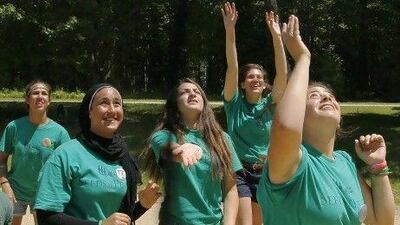OTISFIELD, MAINE // The Arab Spring uprisings have brought a new sense of optimism to young people from troubled nations as they spend time together at a special camp nestled in the hills of western Maine.
Here, they can confront and resolve their differences.
Lina, 17, from Cairo, witnessed the regime change in her home country of Egypt. Now, on a sunny afternoon at the lakeside Seeds of Peace camp, she said: "It gives me the feeling that everything is possible and nothing is impossible.
"We believe that with change, peace is possible. We believe we are the leaders of the future."
Seeds of Peace is now in its 20th year of bringing together children from countries in conflict. There are more than 200 campers this summer, the most in the camp's history, including Israelis, Palestinians, Jordanians, Egyptians, Indians, Pakistanis and Afghans.
The three-and-a-half-week event also comes as the regime change in Egypt concludes, fuelling the optimism that young campers such as Lina can carry their message into the world. For security reasons, the camp has a policy against campers revealing their full names.
"The media and politicians make it seem impossible for 'enemies' to want to live together," said Hatem, 16, also from Cairo. "Camp doesn't end when you leave. It begins when you leave."
The pine-shaded camp features outdoor activities such as football, volleyball, cricket and swimming, interspersed with dialogue sessions, the core of the programme.
Campers, working with facilitators, are encouraged to voice their views that reflect conflicts and seek to resolve their differences.
"We're not here to shy away from the conflict. We're here to confront it," said Eric Kapenga, the communications director for the non-profit organisation.
The activities are designed to build trust. For example, youngsters from different countries and varied backgrounds are paired up on the camp's ropes course, where teammate trust can be crucial in keeping safety-harnessed participants nine metres aloft.
Seeds of Peace was founded by John Wallach, a foreign news correspondent and co-author of two books about the Middle East. He died in 2002. Since its launch, more than 5,000 campers and educators from 27 countries have attended.
Other states and countries also have children's camps and programmes based on similar culture-sharing themes. For example, the non-profit Tuesday's Children - based in Manhasset, on New York's Long Island - creates programmes that bring together children and families whose lives have been dramatically altered by terrorism.
It has also branched out to a new venue - the sea - to promote its goals. A 38-metre schooner this summer travelled from Portland, Maine to New York and Boston with 18 camp graduates, or "seeds", working together as crew members. It is the second year of the Seas of Peace programme, said Leslie Lewin, the organisation's executive director.
The Seeds programme is committed to keeping connections active with campers after they graduate, through a variety of seminars and other gatherings around the world.
More than 65 Seeds graduates are currently meeting in Ireland for a programme on conflict resolution.
Among the graduates, said Mr Kapenga, are a filmmaker whose video went viral and became an anthem for the Egyptian revolution, a Palestinian who is working through the United Nations for Middle East peace and a newsreader on Israeli TV.
Majib, 24, a Seeds counsellor who first visited the Maine camp in 2002 and is a news correspondent in Afghanistan, his home country, said the programme opened his eyes to "a huge spectrum of views". "Even if I don't agree with different opinions, at least I can tolerate them," he added.
Liav, 26, a counsellor from Haifa, Israel, said the lessons learnt at Seeds of Peace can be transmitted to contacts graduates meet in their professional lives. She wants to pursue an environmental career that could bring her into contact with Palestinians over issues such as water rights. "I feel the main thing I've gained here is the ability to talk and listen, she said."

